On November 6…
If Congress can move President’s Day, Columbus Day, Martin Luther King’s Birthday and Memorial Day for the convenience of shoppers, shouldn’t they at least consider moving Election Day for the convenience of voters?
~Andrew Young
While that is true, the fact is they haven’t so it is up to YOU to find the time today to make your vote count.
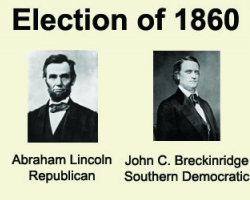
1860 – With tensions over slavery dominating the national landscape, the election of 1860 became a free-for-all. The big problem for the Democratic Party was the slavery issue had split the party (and the country) along geographical lines.
While the (Northern) Democrats selected Stephen A. Douglas to represent them, (Southern) Democrats eventually chose to form their own party and run their own candidate, John Breckinridge.
At the national Republican convention, none of the front-runners could find enough support to represent the entirety of the party. Abraham Lincoln became the compromise candidate.
But that wasn’t the end of it. Yet another party had formed, the Constitutional Union Party. Made up of members of the other political parties (including the Whig Party) they chose Speaker of the House John Bell as their candidate.
Breckinridge proved far more attractive to Southern voters, and the Southern Democrats won 11 states and 72 electoral votes. Bell and the newly formed Constitutional Union Party carried three states and 39 electoral votes. Douglas and his (Northern) Democrats won only one state, Missouri, with 12 electoral votes, despite winning 1.3 million popular votes.
The winner in the election, though, was Lincoln, carrying 18 states and 180 electoral votes, a clear majority.
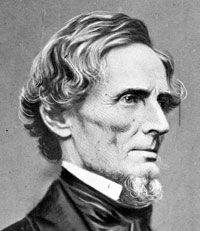
1861 – Jefferson Davis was elected president of the Confederate States of America. He ran without opposition, and the election simply confirmed the decision that had been made by the Confederate Congress earlier in the year.
Davis was elected to a six-year term as established by the Confederate constitution. He remained president until May 5, 1865, when the Confederate government was officially dissolved.
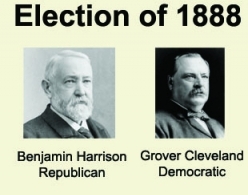
1888 – Benjamin Harrison, a grandson of former President William Henry Harrison, defeated President Grover Cleveland.
On Election Day, Cleveland and the Democrats garnered more popular votes than Harrison and the Republicans, but it was the Electoral College that determined the winner, as always, and Harrison, by less than 1 percent, managed to win Cleveland’s home state of New York, and with it, the election.
The final national popular vote tally had Cleveland ahead by just more than 90,000 votes (out of nearly 10.5 million votes cast) but the final electoral tally was 233-168, in favor of Harrison.
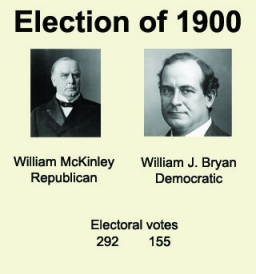
1900 – With the United States enjoying a return to economic prosperity and a victory in the Spanish-American War, President William McKinley easily defeated William J. Bryan at the polls, just as he had done four years earlier.
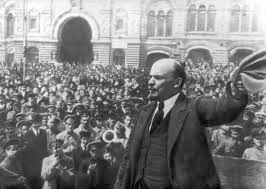
1917 – Led by Bolshevik Party leader Vladimir Lenin, leftist revolutionaries launched a nearly bloodless coup d’état against Russia’s Provisional Government.
The Bolsheviks and their allies occupied government buildings and other strategic locations in the Russian capital of Petrograd (now St. Petersburg) and within two days had formed a new government with Lenin as its head.
Bolshevik Russia, later renamed the Union of Soviet Socialist Republics, was the world’s first Marxist state.
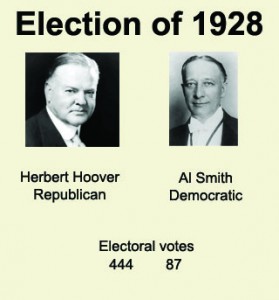
1928 – With incumbent Calvin Coolidge declining to run for re-election, Herbert Hoover, his Secretary of Commerce, won the Republican nomination and squared off against New York Governor Al Smith.
As a committed anti-Prohibition candidate, Smith attracted not only drinkers but also voters angered by the corruption and lawlessness brought about by prohibition. However, as the first Catholic to be nominated, he was feared among Protestants, including German Lutherans and Southern Baptists, who believed that the Catholic Church and the Pope would dictate his policies.
Hoover was perhaps most well-known for his role at the head of the U.S. Food Administration. He was also famous for organizing the return of tens of thousands of Americans from Europe after World War I and for his volunteer work helping the countries of Western Europe recover from the war.
In the end, the booming economy and the anti-Catholic concern among voters resulted in a landslide victory for Hoover.
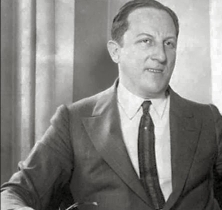
1928 – Arnold Rothstein, the head of the Jewish mob in New York, died, two days after being shot by George “Hump” McManus for failing to pay a large gambling debt.
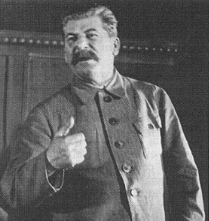
1941 – Soviet leader Joseph Stalin addressed the Soviet Union for only the second time during his 27-year rule.
Speaking from inside the marbled halls of the Mayakovsky train station in Moscow, Stalin promised that if the Germans “want a war of extermination, they shall have one.”
He falsely stated that even though 350,000 troops were killed in German attacks so far, the Germans had lost 4.5 million soldiers and that Soviet victory was near, even as German tanks, previously mired in mud, began to roll over now frozen ground in their advance toward the Soviet capital.
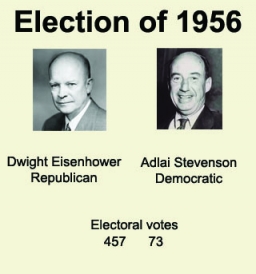
1956 – President Dwight Eisenhower, in a re-run of the 1952 election, easily defeated Adlai Stevenson. It was the first presidential campaign to make wide use of television ads.
Eisenhower had been in poor health during his first term, and the Democratic campaign tried to make this an issue. However, Eisenhower had also helped bring an end to the Korean War and was still very popular for his role in helping end World War II.
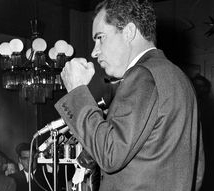
1962 – Former Vice-president Richard M. Nixon lost the California election for governor to Edmund Brown. Nixon blamed the news media for his loss and promised, “You don’t have Nixon to kick around anymore.”
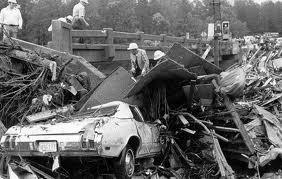
1977 – The Toccoa Falls Dam in Georgia gave way and 39 people died in the resulting flood.
Ninety miles north of Atlanta, the Toccoa (Cherokee for “beautiful”) Falls Dam was constructed of earth across a canyon in 1887, creating a 55-acre lake 180 feet above the Toccoa Creek.
Just hours after a volunteer fireman had inspected the dam and found everything in order, the dam suddenly gave way. Water thundered down the canyon and creek, approaching speeds of 120 miles per hour. Although there was a tremendous roar when the dam broke, residents had no time to evacuate.
Within minutes, the entire Toccoa Falls Bible College community was slammed by a wave of water. One woman managed to hang onto a roof torn from a building and ride the wave of water for thousands of feet. Her three daughters, however, were not so fortunate. They were among the 39 people who lost their lives in the flood.
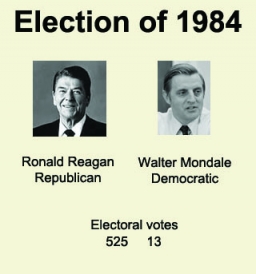
1984 – President Ronald Reagan enjoyed a massive win over former Vice-president Walter Mondale.
Reagan’s popularity, his tough stance against the spread of Communism, and the country’s rising prosperity were all factors. Reagan’s 525 electoral votes (out of 538) is the highest total ever received by a presidential candidate.
Mondale’s only electoral votes came from the District of Columbia and his home state of Minnesota, which he won by a mere 3,761 votes.
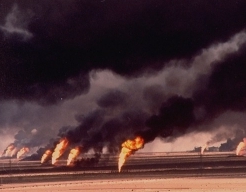
1991 – A Canadian team put out the last of 751 oil well fires started by Iraqi president Saddam Hussein’s troops at the close of the Gulf War.
The fires had burned for approximately ten months, and as a result, approximately 6 million barrels of oil had been lost each day.
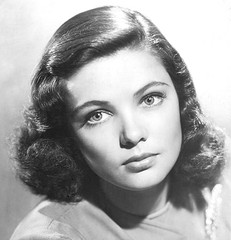
1991 – Actress Gene Tierney (nominated for an Academy Award for Best Actress for her performance in Leave Her To Heaven but best known for her portrayal of the title character in the film Laura) died of emphysema at the age of 70.
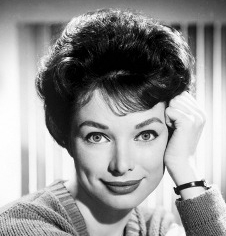
1995 – Actress Aneta Corsaut (best known for playing the role of Helen Crump on The Andy Griffith Show) died of cancer just three days after her 62nd birthday.
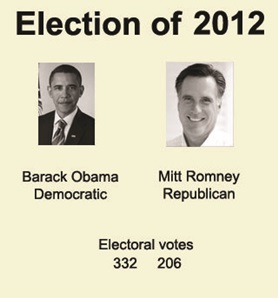
2012 – President Barack Obama won reelection by defeating Mitt Romney.
Romney was genuinely surprised by his defeat. His campaign’s internal polling had Romney and his team so confident of their victory that Romney did not write a concession speech until Obama’s victory was announced.
Compiled by Ray Lemire ©2018 RayLemire.com / Streamingoldies.com. All Rights Reserved.